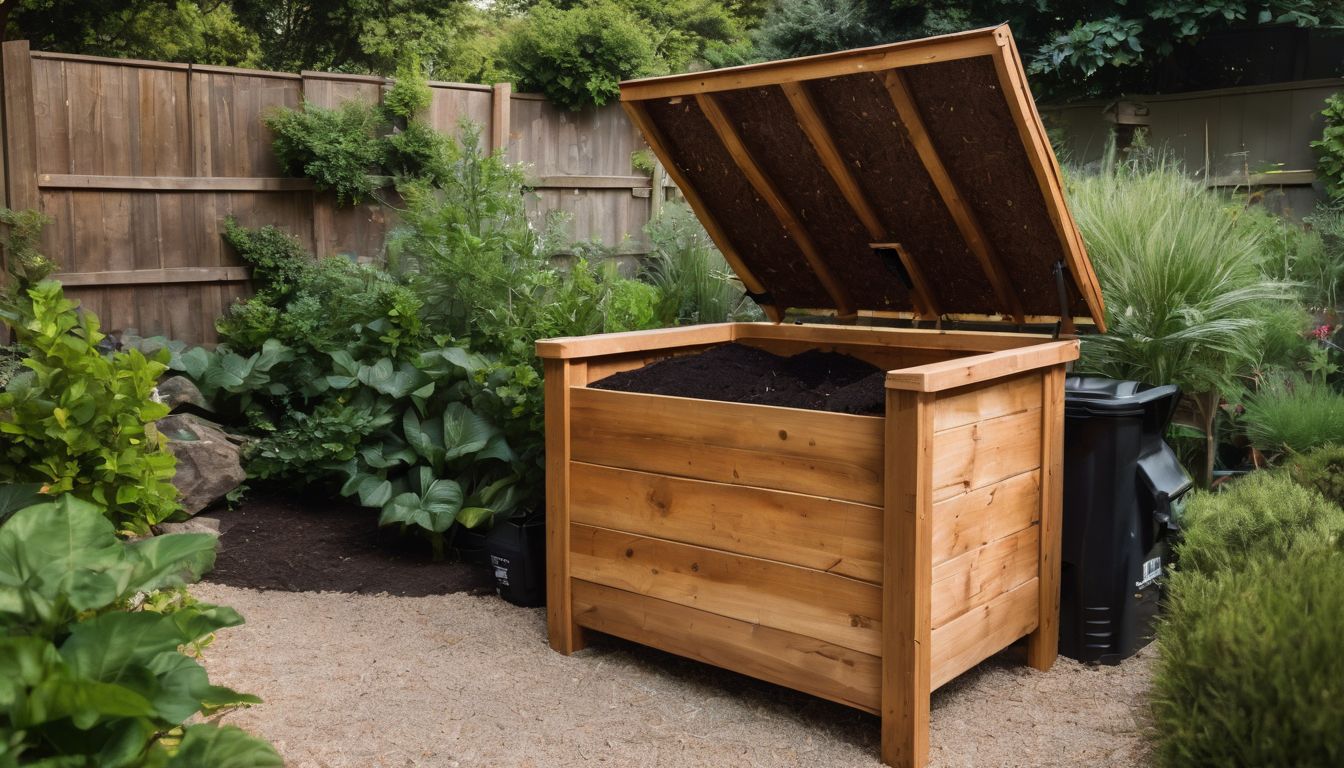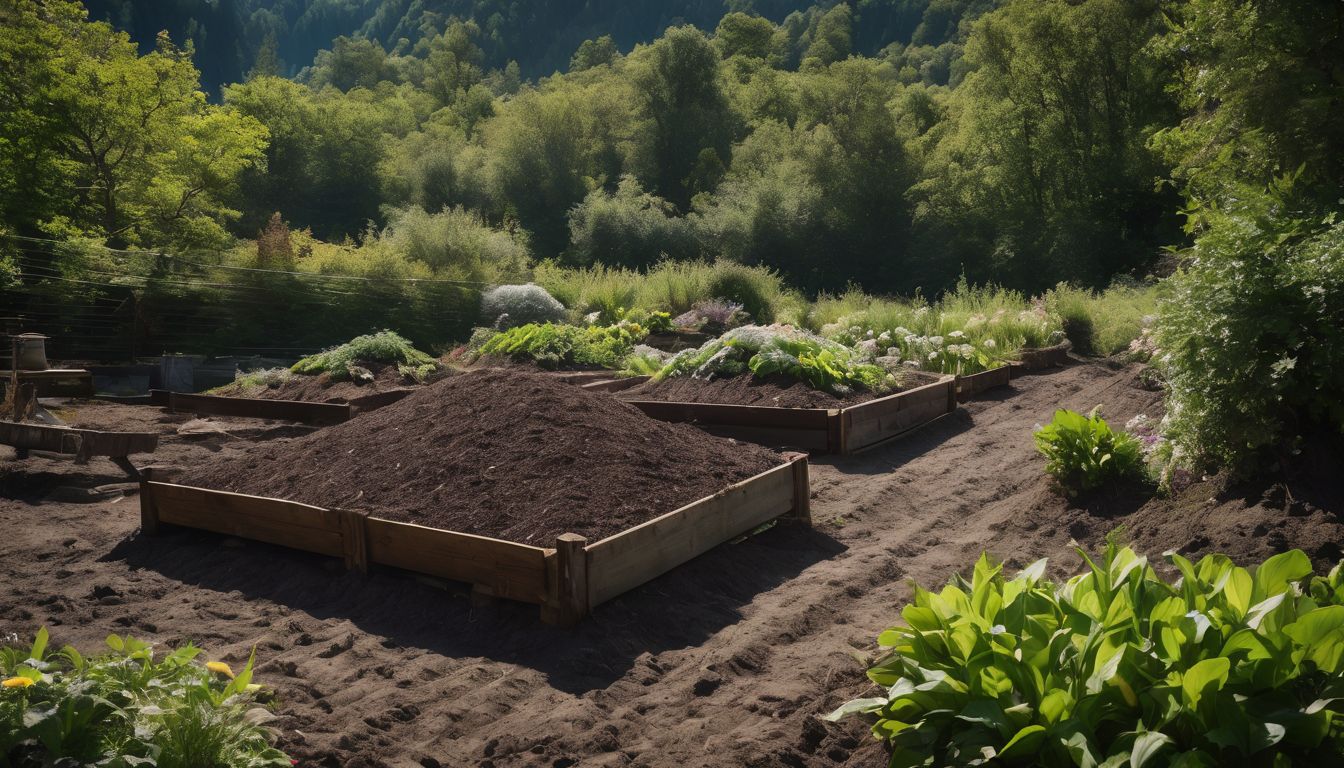Are your plants struggling to thrive? Healthy soil is the secret behind vibrant gardens and robust crops. This article reveals how compost enriches soil, leading to improved plant health and growth.
Discover greener gardens ahead!
Key Takeaways
- Compost infuses the soil with vital nutrients like nitrogen, phosphorus, and potassium, which are crucial for healthy plant growth. By breaking down organically, it also introduces beneficial microbes that enhance nutrient cycling and soil fertility.
- Regular use of compost improves soil structure by preventing compaction, enhancing root penetration and aeration. It increases moisture retention in the soil, reducing the need for frequent watering and conserving water resources.
- Applying compost to gardens or farms can stabilise pH levels within the soil, create an unfavourable environment for pests and diseases naturally without chemicals.
- Beyond promoting plant health, compost has environmental benefits such as reducing erosion by binding the soil together more effectively. It also cleans polluted soils through bioremediation and lowers greenhouse gas emissions by diverting waste from landfills.
- Economically speaking, utilising compost can lead to significant cost savings in agriculture by reducing reliance on chemical fertilisers and pesticides while improving food affordability due to better crop yields.
The Role of Compost in Building Healthy Soil
Compost plays a crucial role in building healthy soil by adding essential nutrients, enhancing soil structure, and stimulating microorganism activity. This creates an optimal environment for plants to thrive and grow.
Adding essential nutrients
Compost works wonders for your garden by infusing the soil with vital nutrients plants crave. As decomposing organic matter breaks down, it releases elements like nitrogen, phosphorus, and potassium — the main ingredients in commercial fertilisers.
These essential nutrients are then readily available to be absorbed by plant roots, leading to healthier growth and improved resilience against pests and diseases.
Moreover, compost introduces beneficial microorganisms that foster nutrient cycling, further enhancing soil fertility. By converting farm waste into rich compost, you’re not just recycling nutrients but also contributing to sustainable agriculture practices that nourish your plants and the environment.
Next up: how this natural amendment transforms the very structure of your garden’s foundation – enhancing soil structure.
Enhancing soil structure
Improving soil structure supports plant health by enhancing root growth and water retention. Compost fosters a crumbly soil texture, preventing compaction and allowing roots to penetrate easily.
This improves the circulation of air and water, vital for nutrient uptake. Additionally, it helps to create an environment that encourages beneficial microorganisms which further aid in nutrient availability for plants.
As we delve deeper into the effects of compost on plant growth, let’s next explore how it contributes to increased moisture retention and improved drainage.
Stimulating microorganism activity
Compost stimulates microorganism activity in the soil, enhancing its health. The organic matter provides a food source for beneficial bacteria and fungi, which work to break down nutrients into forms that plants can use.
This microbial community also helps suppress harmful pathogens, promoting overall soil balance and improving plant resistance to disease.
Furthermore, the increase in microorganism activity encourages the formation of humus, a natural substance that enhances soil structure and water retention. As a result, compost not only supports plant growth but also contributes to the overall health and resilience of the ecosystem.
Effects of Compost on Plant Growth
Compost has a positive impact on plant growth by increasing moisture retention, improving drainage, and encouraging beneficial fungi in the soil. It also stabilises pH levels, reduces pests and diseases, and ultimately leads to healthier and more vigorous plants.
Increased moisture retention
Enhancing soil moisture retention, compost helps plants access essential water for growth. This leads to improved plant vigour and resilience in various environmental conditions, conserving water resources and supporting sustainable gardening practices.
Additionally, the increased moisture retention reduces the need for frequent watering, promoting water conservation and contributing to a more environmentally friendly approach to plant cultivation.
Encouraging mycorrhizal colonisation, compost supports beneficial fungi that aid in nutrient uptake by plants while also improving soil structure. This fosters an environment conducive to healthy root development and enhances the overall health of garden ecosystems.
Improved drainage
Improved drainage is a crucial benefit of using compost in gardening. It helps prevent waterlogged soil, allowing plant roots to access the oxygen they need for healthy growth. By enhancing soil structure and promoting better aeration, compost ensures excess water drains away effectively, reducing the risk of root rot and other moisture-related issues.
The improved drainage facilitated by incorporating compost into the soil also aids in preventing erosion by reducing surface runoff during heavy rainfall. This not only benefits plant health but also contributes to maintaining healthier ecosystems and protecting natural resources.
Better aeration
Improved drainage facilitates better aeration, allowing oxygen to reach plant roots more effectively. This enhanced oxygen availability in the soil encourages healthy root development and supports beneficial microorganism activity – essential for nutrient absorption and overall plant growth.
The increased porosity also helps reduce compaction, ensuring that water penetrates deeper into the soil and prevents waterlogging. Consequently, this improved aeration contributes to healthier plants with stronger resistance to environmental stressors such as drought.
Encouraging beneficial fungi by fostering optimal levels of oxygen in the soil enhances nutrient cycling and aids in disease suppression. Additionally, it promotes the breakdown of organic matter into rich humus, which further improves the texture and fertility of the soil.
Encouraging beneficial fungi
By promoting better aeration, compost creates an environment that encourages beneficial fungi to thrive. These fungi form symbiotic relationships with plant roots, aiding nutrient absorption and protecting against harmful pathogens.
As they break down organic matter in the soil, they also release compounds that improve soil structure and further enhance plant health.
Inviting the right kind of fungi into the soil assist plants by increasing their resilience to stressors and boosting overall growth. The relationship between these fungi and plant roots is crucial for maintaining healthy ecosystems while cultivating crops sustainably.
Stabilising pH levels
Compost helps stabilise pH levels in the soil, ensuring a balanced environment for plants to thrive. By neutralising overly acidic or alkaline soils, compost creates an optimal pH level that allows for better nutrient uptake by plants.
This balance supports healthier plant growth and improves overall soil health, promoting a more sustainable and resilient ecosystem.
Additionally, stabilising pH levels through composting reduces the need for synthetic chemicals to adjust acidity or alkalinity, contributing to a more environmentally friendly approach to gardening and farming.
Reducing pests and diseases
Stabilising pH levels can also contribute to reducing pests and diseases. Balanced soil pH levels create an environment that is less favorable for harmful pathogens and insects, which in turn reduces the need for chemical interventions.
This not only benefits plant health but also aligns with environmentally conscious practices through natural pest control methods.
Encouraging beneficial fungi further aids in reducing pests and diseases by creating a more diverse and balanced ecosystem, promoting natural checks and balances within the soil microbiome.
Benefits of Compost for the Environment and Economy
Compost helps in reducing erosion, cleaning polluted soils, lowering emissions, and saving money on landfill costs. Read more to learn about the positive impact of compost on plant health and growth!
Reducing erosion
Compost helps prevent erosion by improving soil structure and stability. Enhanced soil structure, rich in organic matter, acts as a protective layer against water and wind erosion.
This reduces the risk of topsoil loss from heavy rainfall or strong winds – vital for maintaining resilient farmland. The use of compost also promotes root growth, which further anchors soil in place, preventing erosion.
Moreover, composting increases the infiltration rate of soils, allowing them to absorb more water and reducing surface runoff that can cause erosion. As a result, the risk of sedimentation in water bodies is reduced while also helping to maintain nutrient balance within ecosystems for healthier plant growth.
Cleaning polluted soils
Compost helps to clean polluted soils by promoting the growth of beneficial bacteria and fungi that break down contaminants. This process, known as bioremediation, detoxifies the soil and reduces chemical pollutants while restoring its natural fertility.
The organic matter in compost also binds heavy metals, preventing them from leaching into groundwater and further contaminating the environment.
As we delve deeper into how compost cleans polluted soils, it’s crucial to understand its profound impact on our ecosystems. Let’s explore how composting can lower emissions and sequester carbon, contributing to a healthier planet for current and future generations.
Lowering emissions
Compost aids in lowering emissions by reducing the amount of organic matter that decomposes in landfills, producing harmful greenhouse gases. Instead, when organic waste is composted, it breaks down aerobically, greatly diminishing the production of methane and other noxious emissions that contribute to climate change.
Furthermore, using compost as a soil amendment can enhance carbon sequestration. This means that carbon from plants and other organic materials is stored in the soil rather than being released into the atmosphere as carbon dioxide.
By utilising compost, individuals play an active role in mitigating climate change by minimising greenhouse gas emissions and effectively storing carbon in the soil.
Carbon sequestration
Compost plays a vital role in carbon sequestration, helping to mitigate climate change. When organic matter is added to soil through composting, it retains carbon instead of releasing it into the atmosphere as carbon dioxide.
This process effectively removes CO2 from the air and stores it in the soil, aiding in reducing greenhouse gas emissions. Additionally, promoting widespread compost use can contribute significantly to increasing soil carbon status, which has extensive environmental benefits such as improving soil fertility and enhancing its ability to support healthy plant growth.
By actively engaging in composting practices, individuals can be active contributors to mitigating climate change and supporting environmental conservation efforts. The increased adoption of composting not only helps improve plant health and crop yield but also aids in addressing the global challenge of reducing greenhouse gas emissions by sequestering carbon in the soil.
Saving money on landfill costs
By diverting organic waste from landfills, you not only reduce the amount of waste that needs to be disposed of but also decrease the associated costs. Composting enables communities and businesses to alleviate pressure on landfill capacity, avoiding the expenses related to waste management and ultimately saving money on landfill costs.
Moreover, embracing composting practices reduces transportation costs for hauling organic matter to landfills. This sustainable approach minimises greenhouse gas emissions linked with waste transportation, contributing positively to both environmental conservation and economic savings.
Improving food affordability
Compost plays a crucial role in improving food affordability. By enriching the soil with essential nutrients, it promotes healthier and more abundant crop yields. This means that farmers can produce more food without having to spend as much on chemical fertilisers, ultimately leading to lower costs for consumers.
Additionally, compost helps to improve soil structure and moisture retention, ensuring that plants have better access to the resources they need to grow.
Furthermore, by reducing reliance on expensive synthetic fertilisers and pesticides, composting contributes to making locally grown produce more affordable. This can benefit both producers and consumers by creating a more sustainable and cost-effective approach to agriculture.
Cost and Policy Implications of Using Compost
Using compost can lead to cost savings by reducing the need for chemical fertilisers and pesticides, as well as lowering landfill costs. Policy recommendations can include incentives for composting, such as tax breaks or subsidies, to encourage widespread adoption of this sustainable practice.
Cost-benefit analysis
The cost-benefit analysis of using compost in gardening and agriculture is a critical component for environmental enthusiasts who weigh both economic and environmental outcomes. Here’s a detailed look at the trade-offs.
| Cost Factors | Benefit Factors |
|---|---|
| Initial purchase or production cost of compost | Reduced need for chemical fertilisers |
| Potential need for additional equipment | Enhanced plant growth and yields |
| Labour for compost turning and application | Lowered watering requirements due to better moisture retention |
| Storage requirements for compost | Improved soil health over time |
| Transportation of compost materials | Decreased plant disease and pest issues |
| Regulatory compliance for commercial composters | Increase in beneficial microorganisms in the soil |
| Time for compost to mature | Positive environmental impact by reducing waste |
Enthusiasts must consider these factors against the backdrop of long-term sustainability and environmental protection. Investments in compost today can lead to substantial economic and ecological dividends in the future.
Policy recommendations
Conclusion: The Overall Impact of Compost on Plant Health and Growth
Enhancing soil structure and adding essential nutrients, compost plays a crucial role in promoting healthy plant growth. Compost increases moisture retention, improves drainage, and encourages beneficial fungi for thriving plants.
Furthermore, it reduces pests and diseases while also benefiting the environment through soil erosion prevention and carbon sequestration. These positive impacts make compost an invaluable resource for supporting sustainable plant health and growth.
FAQs
1. How does compost benefit plant health and growth?
Compost improves soil properties, which in turn stimulates plant growth by providing essential nutrients and improving soil structure.
2. Can using compost prevent soil erosion in my garden?
Absolutely, garden composting significantly helps with soil erosion prevention by creating a more stable environment for plants to anchor their roots.
3. Will adding compost to my garden help control pests?
Yes indeed, introducing compost into your garden can contribute to pest control benefits by fostering a healthy ecosystem that naturally deters unwanted insects.
4. Is it possible for compost to improve the overall condition of my soil?
Certainly, adding good-quality compost is known for its remarkable ability to improve soil properties, leading to healthier plants and more vibrant gardens.





